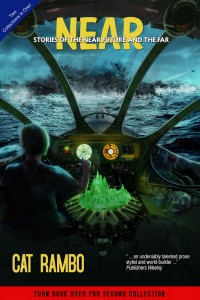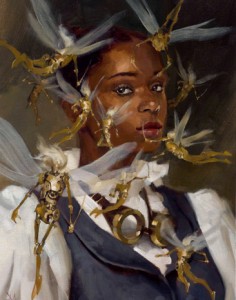 A common science fiction trope is that aliens would think differently from humans. Larry Niven’s carnivorous Kzinti are curious only about things that interest them, C. J. Cherryh’s T’ca are multi-brained aliens that speak in matrices readable in any direction, and Steven Spielberg’s aliens from Close Encounters of the Third Kind communicate with music and gesture.
A common science fiction trope is that aliens would think differently from humans. Larry Niven’s carnivorous Kzinti are curious only about things that interest them, C. J. Cherryh’s T’ca are multi-brained aliens that speak in matrices readable in any direction, and Steven Spielberg’s aliens from Close Encounters of the Third Kind communicate with music and gesture.
But, even just on the Earth, every human being thinks differently! This tremendous variation is called neurodiversity, and each individual’s distinctive cognitive style is their neurodivergence. Many kinds of neurodivergence are common, including autism, anxiety, synesthesia, and more – sometimes presenting challenges to individuals if society demands a different thinking style.
But could these different thinking styles actually help us understand aliens? Many autistic folks experience hyperfocus on special interests: could they better empathize with Kzinti? Could someone with dissociative personality disorder better understand the multiple-brained T’ca? And could a person with difficulty verbalizing better harmonize with Spielberg’s aliens?
My co-editor Liza Olmsted and I decided to explore whether neurodiversity would help us understand aliens in The Neurodiversiverse: Alien Encounters, a hopeful, empowering science fiction anthology from Thinking Ink Press exploring neurodivergent folks encountering aliens. Over forty contributors shared with us stories, poems and art exploring this theme.
For example, in “The Space Between Stitches” by Minerva Cerridwen, an autistic person’s hyperfocus helps her effortlessly repair an alien’s broken teleporter. In “Where Monolithic Minds Can’t Travel,” Akis Linardos explores whether aliens with multiple minds would resonate with dissociative disorder, unlocking travel to the stars. And in “Music, Not Words” by Ada Hoffmann, aliens that speak in music find harmony with a young woman who has trouble with words.
Many stories in The Neurodiversiverse are told from an authentic #ownvoices perspective, in which authors write stories about characters who share their own distinctive experiences. For example, I struggle with social anxiety disorder, and in my own “Shadows of Titanium Rain,” give those experiences to the character Djina as she struggles to understand solitary aliens.
Liza and I feel #ownvoices are particularly important because they improve the representation of marginalized voices in stories, which is part of the mission of Thinking Ink Press. Sometimes, it can be hard to imagine achieving something if you’ve never seen someone like yourself doing it – and it can be hard to solve a problem if you have no words to describe it.
We’re bringing The Neurodiversiverse to life no matter what, but because we’re a small press, we’re running a Kickstarter to help defray the costs of producing and promoting the book. In particular, we want to pay our authors the Science Fiction and Fantasy Writer’s Association (SFWA) “professional rate” of 8 cents a word, and the Kickstarter will help us do that.
Creating The Neurodiversiverse has been a voyage of discovery for us. Recently Thinking Ink Press embraced its identity as a publisher focused on marginalized voices – something we had always done, but not precisely noticed that we were doing; but once we noticed that it was our focus, we decided to lean in on that and do it well.
Exploring the topic of neurodiversity inspired me to propose “The Neurodiversiverse Anthology,” which I shared with our team to ensure we handled it sensitively. Liza was enthusiastic, joining as my coeditor and helping craft the anthology’s explicit focus on hopeful, empowering and #ownvoices stories. And work on the book awakened my understanding of my own struggles with neurodivergence, particularly social anxiety disorder and autism.
The Neurodiversiverse has opened doors for us as not just editors but as people with our own struggles with neurodivergence, and we hope it has a similar impact on everyone who reads it. So please back our Kickstarter (accessible during the campaign via neurodiversiverse.com) where you can not only help us pay our authors, you can get a copy of the book and find out the answer to the question, “Would neurodiversity help in an encounter with aliens?”
You can find the Kickstarter here.
 About the author: By day, Anthony Francis teaches robots to learn; by night, he writes science fiction and draws comic books. His “Dakota Frost, Skindancer” urban fantasy series begins in the award-winning FROST MOON and continues in BLOOD ROCK and LIQUID FIRE. His latest novel is JEREMIAH WILLSTONE AND THE CLOCKWORK TIME MACHINE. He co-edited the anthology DOORWAYS TO EXTRA TIME and is the co-editor of the forthcoming anthology THE NEURODIVERSIVERSE: ALIEN ENCOUNTERS; for more information check out neurodiversiverse.com . You can read more about Anthony’s words, art and science on his blog “The Library of Dresan” at dresan.com.
About the author: By day, Anthony Francis teaches robots to learn; by night, he writes science fiction and draws comic books. His “Dakota Frost, Skindancer” urban fantasy series begins in the award-winning FROST MOON and continues in BLOOD ROCK and LIQUID FIRE. His latest novel is JEREMIAH WILLSTONE AND THE CLOCKWORK TIME MACHINE. He co-edited the anthology DOORWAYS TO EXTRA TIME and is the co-editor of the forthcoming anthology THE NEURODIVERSIVERSE: ALIEN ENCOUNTERS; for more information check out neurodiversiverse.com . You can read more about Anthony’s words, art and science on his blog “The Library of Dresan” at dresan.com.
If you’re an author or other fantasy and science fiction creative, and want to do a guest blog post, please check out the guest blog post guidelines. Or if you’re looking for community with fellow fantasy, science fiction, and horror writers, sign up for the Rambo Academy for Wayward Writers Critclub!






